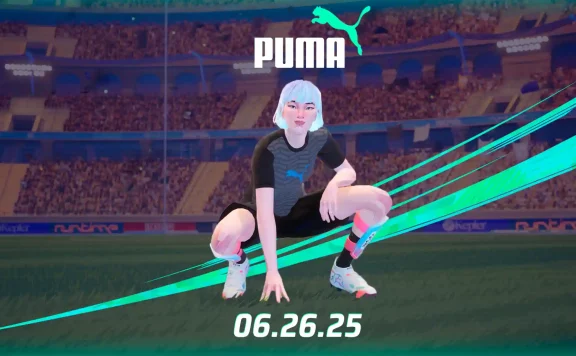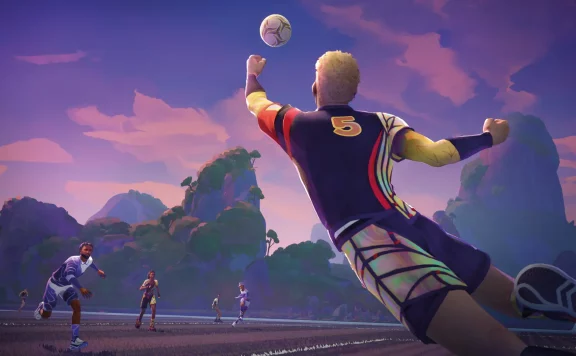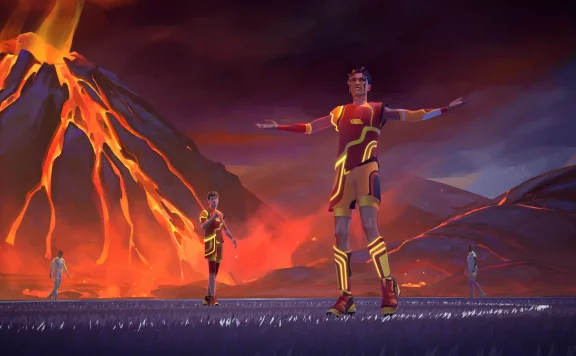Imagine this: The keeper has just hoofed the ball halfway down the pitch, landing perfectly at your feet. You immediately start sprinting, nobody in between you and the goal except their keeper. You cut inwards, plenty of space around you and pull back your leg to shoot. One of three things happens:
- You take the shot. It either squeaks past the keeper and it’s a goal, or they manage to save it. The important thing here though is that you took the shot.
- You get tackled. Not by someone on the other team, we’ve already established they’re not close enough. No, someone on your own team decides to tackle you because they want the glory.
- The game lags and you realise you never actually got the ball at the halfway mark, it was scooped up by the opposition and they’ve just scored.
In a standard quick play game of Rematch, any one of those things could happen, and did happen to me multiple times during the review period. While mechanically a very fun game, it’s the experience of playing with random people and the plethora of network-related issues that keep it from advancing up the table.

The latest game from Slocap, the Sifu developers, Rematch is a 3, 4 or 5-a-side football game where each player is controlled by someone. It follows the “simple to learn, difficult to master” mantra that games like multiplayer sports games Rocket League have pioneered, and it’s something that Rematch does very well. All you need to know is how to shoot, pass and sprint. There’s a handful of advanced techniques for outmanoeuvring the opposition or setting up volleys, but it’s how you apply the basics that really matters.
With such small teams, your positioning, awareness, and teamwork are all crucial. It only takes one tackle for the ball to be whipped away from you and halfway towards your own goal, so playing together with your team is not just a good idea, it’s usually the best way to win a match. It’s in these moments of teamwork where Rematch feels it’s best. Pinging passes between your teammates across the pitch, ending with someone in the box volleying the ball into goal feels magical, and something I’ve not experienced in any other sports game. You can call out for the ball using R3, which also paints a helpful guideline for the person with the ball so they can aim their pass more effectively, and when combined with an actual team of friends communicating verbally, it’s genuinely a fantastic experience.
Playing with a group of random people, though, is a completely different ballgame. I’d go as far as describing it as “miserable” at times: you’ll regularly be left shouting for the ball, completely in the open with nobody around to tackle you while Messi over there loses it for the fifth time in a row because he refuses to pass. Keepers will just boot it to the other end of the pitch for no reason, essentially giving the ball away, and you’ll be surprised at just how often your own teammates will slide tackle you. Everyone wants to score and nobody wants to play collaboratively, and in matches like that it’s just a depressing time because you know that with a little teamwork the game could be great. It feels like playing a football game with people who have never heard of football.

Developer Slocap has also come up with a great way of managing the goalkeeper. Whoever is in the box gets a pair of gloves, which means they get access to dives and slides for saving shots. Step out of the box and the gloves come off, accompanied by the satisfying sound of Velcro tearing. It’s a genius idea and is clearly there to encourage people rotating in and out of goal. Again, in a team that’s communicating it works really well, but with a group of random players it can become a bit of a liability. There’s been many a time where the opposition has shot from their own half, and I’ve turned around to realise our keeper decided he wanted to play in midfield and didn’t tell anyone. Or there’s been three of us in the box but the game decides not to give anyone the gloves.
Which brings me onto another major issue that I’ve had during the initial period of the game launching: technical issues. Luckily I think these are mostly network-related, and hopefully they’ll get better soon, but from the moment the game was available to play it had some of the most egregious lag and latency issues I’ve ever seen. I’ve got several clips where I’ve got the ball at my feet only for it to teleport to the other side of the pitch as the opposition scores. Tackles struggle to connect, players lag forwards and backwards while sprinting and other issues that, at times, made the game almost unplayable. Slocap got patches out during this period, but honestly at times they seemed to make things worse. Performance seems to be a bit better now, but I can’t write about my experience with the game without bringing up these issues, and if they ever rear their head again in future then you should know that they’ll immediately ruin your time with the game.

Visually the game has a soft, minimalist aesthetic which looks fine. Your avatar is essentially a blank slate for you to tart up with cosmetics earned through a slightly confusing battle pass. The style suits the fast-paced nature of the game nicely, and it’s never difficult to pick out your team from the opposition on the field. Other customisation options include celebrations and poses, and like Rocket League there are multiple pitch types on offer too, although unlike Rocket League these are classed as cosmetics. They’re a nice touch but they lack both the visual and aural style of their car football counterparts.
Rematch is a good time but it really is a game of two halves. Playing with friends in party chat where you’re willing to pass and play collaboratively is one of the most fun and rewarding multiplayer experiences you’ll find. However, stepping into quick play with a group of random people can (and probably will) leave you frustrated and wondering why you bothered. It’s still a game I’d recommend, but just keep this in mind before you decide to pick it up.






